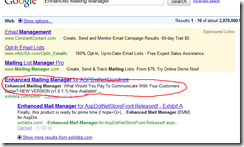So, you’ve spent all this time, money and effort on optimizing your site so that it gets the exposure it deserves in search engines like Google, Yahoo and Bing. And then Google announces that personalized search results are really the wave of the future. You see from first hand-experience that no only are search engine results being tailored to your search patterns when you are logged into Google, but you are also seeing that your anonymous Google Searches are being similarly affected. How do I optimize against the 6.8 billion "search engines" (individual Internet users who’s results are being manipulated to put them in control of what they see)?
The first thing one needs to do, if you haven’t already, is to accept that Google is modifying SERPs for EVERYONE, not just logged in customers. It has been reported that the cookies that Google uses to track habits on anonymous users live for 180 days and that new data will replace the old data. So, logged in or not, Google is going to use the information about what you do with their results to present you with more of what they think you want.
The perfect example of this is the case where, as an anonymous user, you search for a particular product and click on review site about this product. Google will then modify your results to place this site, and others like it, ahead of shopping or possibly even the company page for this product.
So, you ask, how can I make sure that I rank better with individuals? Well, I’m glad you did ask. The answer to your question is our old friend, the META Description. But you cry out "But Google and Yahoo said some time ago that they no longer use meta descriptions to determine search rankings!"
Well, it is true that it won’t affect your standard page results but it CAN affect your personalized search results by encouraging user click-through which means on subsequent searches by this individual, your site will rank higher than it would otherwise.
Tell me you didn’t stop putting meta descriptions on your pages. No really, tell me you didn’t really do that, did you? Well, I must admit, I got lucky in the example above because Google actually pulled some useful text of the page despite my not putting in a compelling meta description. Usually you aren’t so luck and Google will grab some text off the page that does nothing to entice the potential customer to click through to your site.
So, do as I say and not as I do and WRITE COMPELLING META DESCRIPTIONS for EVERY page on your site now to make a difference in your placement in this world of 6.8 billion search engines.
Got any thoughts that are pertinent to this discussion? Please post them in the comments below and let’s see if we can’t get a discussion going about this topic that I think is valuable to ALL website owners.
- Setting up SSL on Amazon Linux Instance under EC2 - July 26, 2018
- Method Chaining of Objects in C# - January 16, 2017
- Native SQL Backup And Restores on AWS RDS - November 9, 2016
